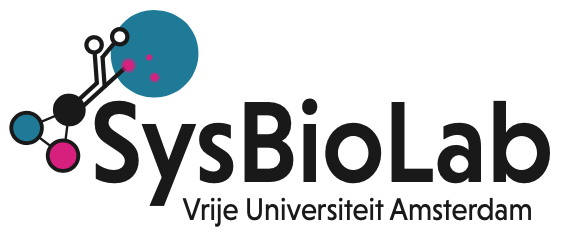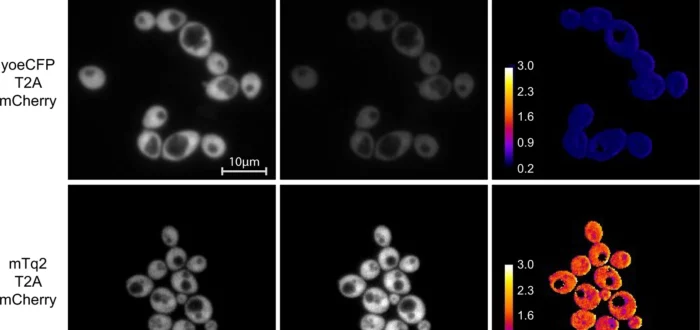We are excited to share that Bas Teusink and Dennis Botman got a depositor collection page on Addgene, called the Botman-Teusink Yeast FP Collection (https://www.addgene.org/depositor-collections/botman-teusink-yeast-fp/). This collection features a comprehensive set of yeast codon-optimized fluorescent proteins (FPs) in various plasmids, enabling constitutive overexpression of FPs and tagging of genes of interest with FPs in yeast, both with
Lab News
In the temple of Amsterdam’s music, Bimhuis and Muziekgebouw, Bas and his AIMMS team organized a two-day festival celebrating how multidisciplinary molecular sciences can create societal impact. The music of life is made by orchestra of molecules, and so the venue was a perfect fit. With workshops, keynotes, discussions and poster sessions, the place was
Jurgen and Christoff contributed a kinetic modelling analysis to a publication that came out last month in Nucleic Acid Research. The paper describes improved measurements of globally quantify RNA processing rates and half-lives for mRNAs in the sleeping sickness parasite Trypanosoma brucei. Christoff plugged those values into a kinetic model of gene expression. The modelling
How can you measure something that cannot be measured directly? Think of a rate: this must always be inferred from some other measurements. In the 6th of Jan issue of Nature Metabolism the Springer lab describes a new mechanism by which cells can measure metabolic rates – in this case rates of the conversion of the
A new collaborative paper with Greg Bokinsky has just came out in Nature Communications! You find it here: paper link. When temperature changes, the kinetics of enzymes change (think of the Arrhenius law) as well as their diffusive properties (the diffusion coefficient depends linearly on temperature, at constant viscosity). The change in the diffusion coefficient
Ecem Yuksel, Remco Kort, and colleagues wrote a new review about the different bacteria in our intestines that can degrade a certain kind of dietary fiber called pectin, and how this can benefit our gut health. Check out the review here! (Picture from here) The human gastrointestinal microbiota, densely populated with a diverse array of
The new academic year kicked off on 2 September 2024 with the Opening Academic Year. This year’s theme was ‘Reasons for Hope’. Bas was interviewed as part of the panel and spoke as the Director of AIMMS about how we are committed to making a positive impact on life and the environment by accelerating breakthroughs
C2W:Mens & Molecule is a Dutch publication platform (including a magazine) for independent science journalism for chemistry and life sciences. Our current research on usage of alternative cofactors (e.g. replacing the NADH/NAD couple) in novel metabolic engineering strategies for microbial biotechnology has recently feature in this magazine. We carry out this research in collaboration with
Maaike and Pranas participated in the third summer school on Economic Principles in Cell Biology that took place on the 8-11th July, 2024, in Paris and online. Lab PhD students Francesco and Luis also attended the lectures online. Maaike was one of some 30 participants selected for in-person attendance, and Pranas gave one of the
Since cells have finite biosynthetic resources for protein synthesis, a rise in one protein concentration is generally at the expense of that of others. A logical consequence is then that phenotypic traits trade-off: cells cannot excel at everything. They cannot grow fast and be very stress tolerant and adaptive to new conditions at the same
Lab news
- Now available: our yeast fluorescence proteins on Addgene
- AIMMS festival was a great success!
- New paper: Modelling the gene expression cascade of Trypanosoma brucei with novel experimental data
- Bas, Frank and Bob comment in Nature Metabolism on sensing of metabolic rates
- A new Nature Comm paper: How a bacterium adapts its membrane fluidity to temperature without a thermometer
Recent Posts
- Now available: our yeast fluorescence proteins on Addgene
- AIMMS festival was a great success!
- New paper: Modelling the gene expression cascade of Trypanosoma brucei with novel experimental data
- Bas, Frank and Bob comment in Nature Metabolism on sensing of metabolic rates
- A new Nature Comm paper: How a bacterium adapts its membrane fluidity to temperature without a thermometer
Archives
- February 2025
- January 2025
- October 2024
- September 2024
- August 2024
- July 2024
- April 2024
- February 2024
- January 2024
- November 2023
- September 2023
- August 2023
- July 2023
- June 2023
- May 2023
- April 2023
- March 2023
- February 2023
- December 2022
- November 2022
- May 2022
- April 2022
- March 2022
- February 2022
- September 2021
- May 2021
- April 2021
- December 2020
- October 2020
- September 2020
- May 2020
- February 2020
- December 2019
- November 2019
- September 2019
- August 2019
- July 2019
- June 2019
- May 2019
- April 2019
- February 2019
- November 2018
- October 2018
- June 2018
- May 2018
- March 2018
- February 2018
- January 2018
- November 2017
- October 2017
- August 2017
- July 2017
- June 2017
- May 2017
- April 2017
- March 2017
- January 2017
- December 2016
- September 2016
- August 2016
- July 2016
- June 2016
- May 2016
- April 2016
- March 2016
- February 2016
- January 2016
- December 2015
- November 2015
- September 2015
- July 2015
- April 2015


Recent Comments